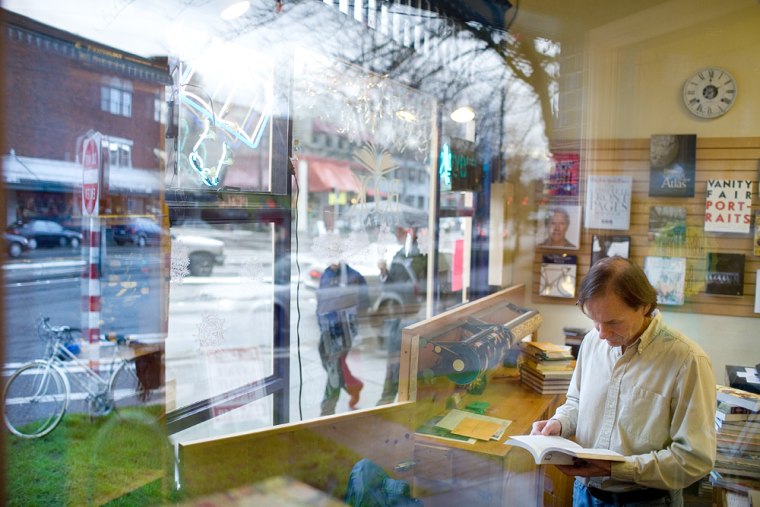For bookstore owner Henry Burton, the difference between a good holiday season and a bad one is the difference between whether he gets a paycheck for the year or not.
This may be one of those years he goes without.
Burton, who has owned Fremont Place Book Co. in Seattle for four and a half years, is among the thousands of independent retailers who rely on the holiday season to keep the doors open and lights on.
With the economy in recession and consumers in cost-cutting mode, this year is expected to be especially tough for smaller shops like his, as customers rein in overall spending and seek out bargains from big chain stores or online discounters.
To get a sense of how small businesses are dealing with the recession, msnbc.com has been following the fortunes of three small stores around the country: a bookstore, a gift shop and a consignment store. Today we’ll report on how the businesses have fared so far this year. In January we’ll check back in with them again to find out how they did.
One day at a time
Even though the headlines seemed to be blaring more dire economic warnings by the day, Burton, the Seattle bookstore owner, went into November feeling OK about the coming holiday season.
Burton’s bookstore, located in a quirky neighborhood of gift shops, restaurants and bars that dubs itself “the center of the universe,” saw business improve slightly in August, September and October, compared with 2007.
But in November, as the election passed and interest in political books waned, the reality of a severe economic downturn began to set in. Burton started to hear from some of his regular customers — many also self-employed or independent business owners — that the weak economy was taking its toll on their finances.
That month, business fell by 10 percent.
“I think November is when it finally hit for regular folks,” he said.
On the day before Thanksgiving, Burton had revised his opinion about the holidays, saying he was feeling only “mildly hopeful” the season would be halfway decent.

Like a lot of retailers, Burton counts on the holiday season for a good chunk of his profits — in his case, so he can pay off bills and perhaps even give himself a paycheck. While he doesn’t think a dour 2008 holiday season would be enough to run him out of business, it would mean that he starts out the new year behind on his bills and trying to decide which of the books in his inventory will need to be sent back to distributors and publishers.
As is typical for small business owners, he also has little wiggle room to deal with a downturn in business. Even in the best of times, he said, the bookstore is supporting itself more than it’s supporting him.
“Quite frankly, I don’t make a lot of money on this deal. It’s more a labor of love, and fortunately I have other sources of income that support me so I don’t need to pay myself,” he said. “If I had to live on this business, I wouldn’t be able to do it.”
To make ends meet, he relies on investments and helps run a business teaching dance.
Burton bought the 20-year-old store after having done some consulting work for its previous owners. (He previously had run a bookstore elsewhere in Seattle but closed it after a Barnes & Noble opened nearby and business fell off.)
Burton gets business from tourists and loyal neighborhood residents, and he tries to stay competitive against bigger chains and online stores by offering same-day special orders and individualized service.
To get through this holiday season, he planned to stock fewer pricey coffee table books and concentrate more on less expensive calendars and other gift items.
By Thursday, Dec. 11, business for the month was tracking down about 8 percent from last year. But that weekend, Burton was pleasantly surprised when business was about even with the comparable weekend in 2007, despite a cold snap and light snowfall.
“As long as we don’t get any major snowstorms or anything like that, I’m thinking we might do as well as last year,” he said Monday.
Still, with so much uncertainty, he admitted his mood was changing by the day.
“If we have a good weekend, like this, it’s like, ‘OK, good, I think we’ll be OK,’” he said. “If we have a couple down days it’s like, ‘Oh, man, the world’s gonna end tomorrow.’”
‘We didn’t take chances’
For Ellen Seale Durst, owner of the Artisan Center in Denver’s tony Cherry Creek neighborhood, the ominous signs began in September.
The gift shop, which specializes in jewelry, scarves, bags and children’s items, saw business fall 10 percent that month as the financial crisis began to hit in full force.
“As soon as the markets started going and our financial system started breaking down, we felt it,” said Durst, who has run the store for 32 years.
The normally busy neighborhood, which is packed with shops, restaurants, businesses and upscale homes, also grew quieter and has stayed that way since.
“We definitely see less people on the sidewalks. It’s very noticeable,” she said.
The sudden drop in business left Durst fretting about the holiday season, when the store typically does 30 percent of its business. Moving quickly, she decided not to hire as many holiday staffers, cut back on little extras wherever she could and re-evaluated her product mix.
In jewelry, which accounts for 40 percent of the store’s sales, she opted to focus on less expensive pieces. In general, Durst and her staff decided to be more cautious about what inventory they took on.
“We didn’t take chances,” she said.
Over Thanksgiving weekend, the strategy seemed to work well. The store saw brisk sales of jewelry items in the $30 to $50 range, and discounted items continued to do well.
“We’ve met the goal every day, but the goal is 10 percent down,” she said in early December.
By Thursday, Dec. 11, Durst was even more relieved to see that business, while still down over the previous year, was doing better than she had hoped. The store was still seeing fewer shoppers than in previous years, she said, but many who came in were spending money — and expressing concern and sympathy for her small business.
The progress left Durst hopeful that the store would break even for the year and actually worrying that she would run out of inventory because she had been too cautious in her forecast.
But the following Sunday, another roadblock emerged when temperatures dipped into the single digits, keeping would-be shoppers at home.
By Monday, as the temperature hovered below zero and the forecast called for bitter cold and snow for the rest of the week, Durst was bracing for Mother Nature to deal a blow. So far, she said, business for the month was down between 11 and 13 percent, and she wasn’t expecting shoppers who stayed home on the cold days to come in later.
“They never come back, never,” she said. “If we have a snow day, it’s just lost.”
For some, a bad economy is good for business
When Sarah Meyers opened the doors of her Lexington, Ky., consignment shop in August 2007, the economy appeared to be doing fine and credit was easy to come by. For some businesses, the recession that the nation entered just a few months later might have been disastrous. But for Meyers, a bad economy may actually have been a boost to business.
Meyers said the consignment shop, Ladybug Landing, which focuses on reselling upscale maternity and children’s clothes, has benefited from an influx of people looking to earn some extra cash by selling the pricey outfits they — or their children — may have worn only a few times. In addition, she thinks the tough economic climate has prompted more people who might otherwise have bought new clothes to come to her store seeking a bargain.
She thinks the company also has benefited from its location, on a busy street across from a large obstetrics clinic instead of in a traditional shopping center.
Ladybug Landing reached profitability after about a year, Meyers said, and business has held up through the financial crisis this fall. Sales were up 120 percent for November, as compared to November 2007 and were tracking up 95 percent for December as of the middle of the month.
Unlike other retailers, Meyers said she doesn’t usually see a rush of holiday business, instead getting bumps in traffic when the weather changes. But as holiday shopping started ramping up in December, she did notice more people coming in to cash out on whatever they had earned selling their clothes at her store.
“Everybody’s trying to earn a little bit of extra money to go out and do their Christmas shopping,” Meyers said. “It just seems like everybody’s pinching pennies, and I can understand that. My husband and I are the same way.”
Meyers also had success with two weekend sales in December, in which she discounted some items by 40 percent to compete with more traditional retailers’ holiday sales. Like many other retailers, she’ll also hold another sale, starting the day after Christmas, so she can clear out winter inventory in anticipation of spring and summer items.
